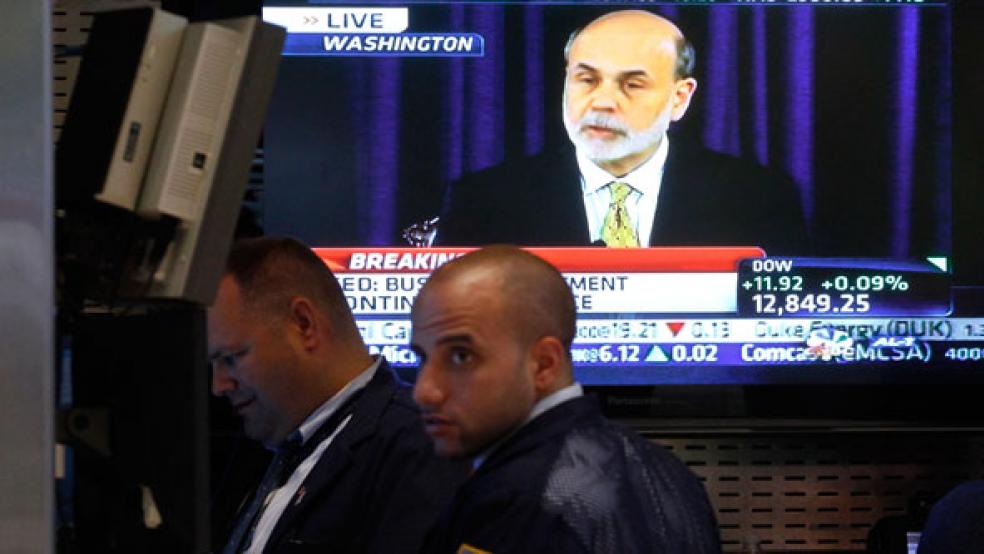QE3 is coming – really, it is. Just trust us.

That’s the refrain on Wall Street, as one economist after another responded to the release of Federal Reserve minutes of a recent policymaking session by insisting that a third round of quantitative easing is inevitable – even though Fed members themselves remain divided and the minutes seemed to indicate little urgency when it comes to undertaking a fresh round of stimulus measures. The fact is that the markets are desperately seeking something that will jump-start investor interest in stocks and other “risk” assets, and absent QE3, there’s precious little out there that is likely to accomplish that.
As we discussed earlier this week, corporate earnings growth appears likely to be flat to modestly higher for the companies in the S&P 500. And what is going to cause those profits to mount still further? Consumers who eagerly snapped up the third version of Apple’s iPad and a 4G-compatible smartphone are going to apply the brakes to their spending if the economy looks as if it’s souring. Indeed, we’ve already seen signs that that is happening in June retail sales figures that, with the exception of gains by upscale department stores, rose far less than even modestly bearish analysts had forecast.
RELATED: 7 Reasons the Fed Should Raise Interest Rates
For months now, economists and strategists have been nodding their heads wisely, arguing that a third round of quantitative easing was coming. For their part, Fed decision makers have either stayed away from the debate, or downplayed the possibility. With each bit of bearish economic data, hope has simply grown – in apparent contradiction of the repeated statements by Federal Reserve Chairman Ben Bernanke that he has no plans to launch QE3. He said it Jackson Hole last August; he repeated it in testimony to Congress at the end of February. Indeed, he has gone further, suggesting that it is fiscal policy – the domain of Congress and the Obama Administration – that need to change for the economy to revive, not monetary policy.
He may well be right, however frustrating that is to Wall Street and investors. The fact is that two rounds of quantitative easing – both involving Fed purchases of Treasury securities or other bonds in order to drive down interest rates – were great news for stocks in the short term. But the impact on both the economy and markets hasn’t been lasting, in either case – although the impact on the Fed’s balance sheet, now swollen to $2.9 trillion as a result of those purchases, certainly has been.
Whether that is the fault of the policy or of extraneous factors, like Europe’s sovereign debt crisis, really doesn’t matter much right now. What does matter is the Fed’s assessment of the risks and potential rewards associated with QE3. The downside is obvious – the Fed’s balance sheet would balloon still further, and there’s no guarantee that any relief rally could be sustained, much less that fresh fiscal policies will be forthcoming. (We are, after all, heading into the final months of the election cycle.) Certainly, St. Louis Federal Reserve Bank President James Bullard described QE3 last month as having “a pretty high hurdle.” “We would be taking a lot more risk on our balance sheet,” he said.
But if Wall Street can jawbone the Fed into acting, it intends to do so. For weeks, pundits have been arguing that QE3 is a sure thing, and the only question is timing. Certainly, they have a growing array of bearish economic data to support their conviction that QE3 is inevitable and necessary. And they’re reading the Fed’s minutes through different eyes, focusing on the fact that more Fed officials seem to be willing to least consider another round of quantitative easing. Bank of America’s economists, for instance, argue that they believe the economic outlook will be so gloomy by the time of the FOMC meeting in mid-September that there will be no other option but QE3.
In the meantime, look for economists to begin celebrating fresh signs of economic trouble and strife, rather than deplore them, out of this conviction that all the Fed needs is a bit more evidence in order to act. But I have to wonder if they really know what they are praying for. Will the third time really be a charm – or will we be in so much trouble by the time the Fed does act that all that we see is a brief sentiment-based rally, and a prolonged struggle to cope with all those assets on the Fed’s balance sheet? Beware of what you wish for…



